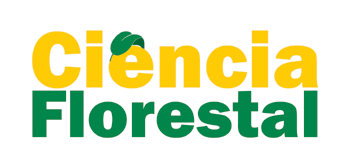ABSTRACT
Vertical stratification - as well as other environmental phytosociological parameters for uneven-aged stands in forest structures - is one of the factors that regulates the amount of energy present in a forest, although it is often disregarded. The objective of this study is to evaluate the performance of some commonly used methodologies to characterize the vertical stratification of a forest fragment. Researchers from UESB - State University of Southwest Bahia collected data in a Seasonal Forest fragment located in the city of Vitória da Conquista, Bahia, Brazil. The standard method used in the study was the Sociological Position Method. Results were compared to six other methods: IUFRO; Vega; Longhi; Calegário; Souza and Leite; and Hasenauer. The performance of each method was assessed according to the “c” coefficient. Results of the standard method showed 954 individuals (656 dominant; 232 codominant; and 66 dominated). The “c” coefficient was found to be efficient to interpret the performance of these methods. The IUFRO Method showed the best performance when compared to the Sociological Position Methods.
Keywords:
phytosociology; uneven-aged stands; sociological position

 Thumbnail
Thumbnail
 Thumbnail
Thumbnail

